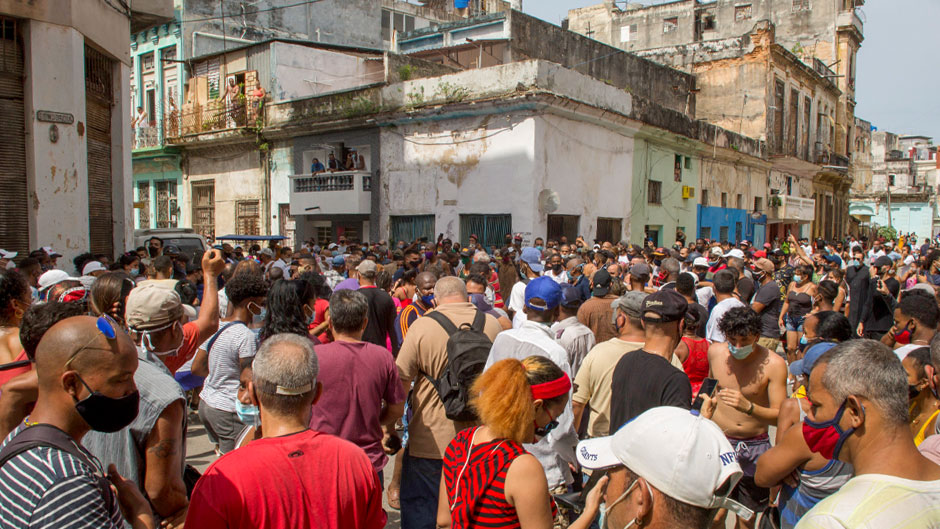In an unprecedented act of civil unrest, thousands of Cubans took to the streets in cities across the Caribbean island on Sunday to protest against the Communist government, its failed economy, the increased repression of the populace, as well as its mishandling of the COVID-19 pandemic.
Images of the protests on the internet showed people shouting, “We want freedom” and “We are not afraid.” Cubans gathered in large numbers from San Antonio de los Baños and Havana in the central part of the country to Palma Soriano in the easternmost province of Oriente.
Yoani Sanchez, the Cuban blogger who was named the first University of Miami Distinguished Presidential Fellow in 2016, wrote in her blog 14yMedio from Havana: “On this July 11, we have shown the world and ourselves that we are many more than those who want to oppress us, that when we are united and act, all they can do is threaten us, jail us, and kill us but not convince us to accept their joke.”
These protests come at a time in which Cuba is undergoing one of its most difficult economic periods since the dissolution of the Soviet Union. Food shortages and frequent blackouts are a daily occurrence on the island. The repression against artists and dissidents has been on the rise in the past year.
“The protests are driven by the dire economic situation in Cuba and the uncontrollable pandemic that—even though the Cuban government has claimed to have two vaccines—the COVID-19 numbers in Cuba have risen every single day,” said Andy Gomez, an academic on Cuban studies and a former associate provost at the University.
The coronavirus pandemic has taken a particularly strong hold on the country. On Sunday, Cuban health authorities reported almost 7,000 new cases and 47 deaths—a record for infections and deaths in a country of just more than 11 million people.
Calla Hummel, assistant professor of political science, stated that these protests are happening in the context of upheaval in Central and Latin America.
“In some ways, COVID-19 has intensified the political upheaval that we are seeing across Latin America,” she said. “We had political crises beforehand, and now we are adding economic and health crises.”
She also said that Cuba had committed to developing its own vaccine but has not created a comprehensive vaccination program. Only 15 percent of the island’s residents have been vaccinated, according to the website Our World in Data.
The pandemic has also halted tourism to the island, which in 2019 contributed $2.97 billion to the country’s gross domestic product, according to Statista. Former president Donald Trump’s administration-imposed sanctions against the island—which still stand—also limit the number of remittances that U.S. nationals can send to their relatives in Cuba.
All this made the protests inevitable, said Sanchez. “It was only a matter of time.”
Cuban president Miguel Díaz-Canel went on Cuban television Sunday and blamed the demonstrations on U.S. infiltrators and the U.S. embargo, and asked government supporters to fight protesters on the street.
Cuban militia used tear gas to disperse crowds. Some video showed people looting government stores. Other videos posted on social media showed violent encounters between protesters and police, overturned police cars, and dozens of people being arrested.
We at @univmiami stand with our Cuban brothers and sisters as they rise up to demand an end to oppression.
— Julio Frenk (@julio_frenk) July 12, 2021
Nosotros en @univmiami nos unimos al pueblo cubano en sus demandas por el fin de la opresión. #SOSCuba #PatriaYVida
"We stand with the Cuban people and their clarion call for freedom and relief from the tragic grip of the pandemic and from the decades of repression and economic suffering to which they have been subjected by Cuba's authoritarian regime,” President Joe Biden said in a statement.
"The Cuban people are bravely asserting fundamental and universal rights. Those rights, including the right of peaceful protest and the right to freely determine their own future, must be respected,” he added. “The United States calls on the Cuban regime to hear their people and serve their needs at this vital moment rather than enriching themselves."
In several cities in the U.S., including Miami, Cuban Americans turned out to support their compatriots on the island. Thousands of Cuban Americans and other supporters flooded the streets around popular Cuban restaurants in Miami—including Versailles in Little Havana and La Carreta in Westchester—calling for the downfall of the Cuban regime.
For Gomez, the future of Cuba remains in the military’s hands. He does not foresee any changes unless there is an internal coup.
“I have no doubt that even though he retired, [former president] Raul Castro was calling the shots yesterday,” Gomez said. One solution to ease some of the conditions the island is encountering, he added, is for the U.S. to lift the restrictions on the remittances sent to the island. According to the research company Bendixen and Associates, it is estimated that the island received $460 million per year.

